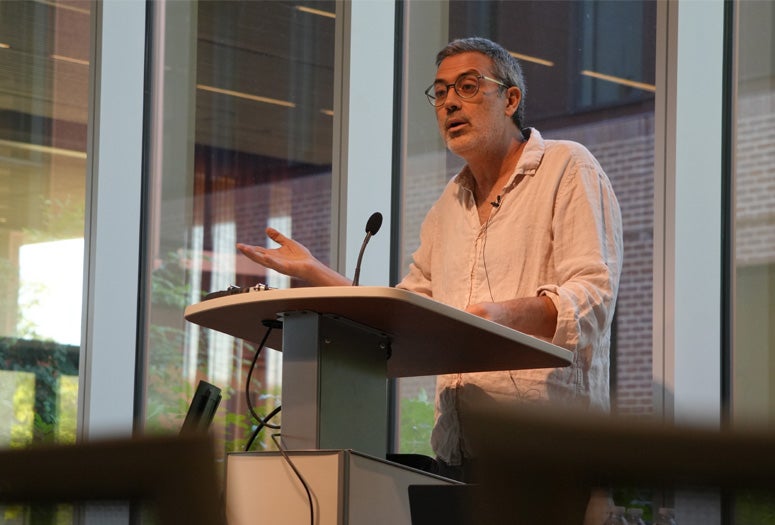
At the bustling crossroads of the Frankfurt Book Fair where novelist and poet Andrea Bajani visited for the prelaunch of his new novel “The Anniversary” (“L’anniversario”), he found himself face-to-face with four people — no, four versions of himself. Each was a translator, reader and writer carrying his voice in their own.
“We were five different versions of myself,” said Bajani, professor in the practice and international writer-in-residence at Rice University’s School of Humanities.
The mosaic of sensibilities included a 65-year-old Spaniard, a Dutch woman, a Greek woman and a man who spoke Catalan. In that moment as he stared at each one, Bajani felt a startling unity.
“For at least some moments, we are the same person,” Bajani said.
Bajani called the encounter more than a peculiar happenstance. It was a reflection of what it means to be multiple selves: to be an author, a teacher, a father and a man endlessly in love with people.
“We have so many houses for all the people we are,” Bajani said.
Describing himself as an “existential writer,” Bajani said that his work delves into the personal, philosophical and political, all while confronting questions he cannot answer. “The Anniversary,” which is set for release in Italy in January and has already been sold in 25 countries, explores themes of family, a topic close to Bajani. In teaching Writing the Family last academic year, Bajani said that his students’ answers often challenged his assumptions.

“I ask them questions I’m asking myself,” Bajani said, noting that these interactions offer as much discovery as they do instruction.
Teaching, Bajani said, is “the better version of going on tour,” a means to share ideas without the pressure of promotion.
“With the strong feeling that, on the contrary, you are part of a little community of people wanting to fight against stereotypes through literature,” Bajani said. “You don’t have to sell anything to anybody. You are still able to discover things about yourself you didn’t know.”
Bajani joined Rice’s creative writing faculty to connect with diverse voices and build a community centered on mutual learning and exploration.
“My biggest passion in life is people,” Bajani said. “I’m so incredibly in love with people, in a way even with the ones I don’t like. They are all usually more complex than most of the novels I read.”
Teaching, he added, allows him to encounter new generations, new cultures and new perspectives.
“All things that are not me,” Bajani said.
This process for Bajani is essential; it compels him to constantly question his own ideas and the themes he brings to his writing. He said the act of writing itself is an experiment with genre boundaries, which he explores alongside his students. He doesn’t view writing through a lens of strict classifications like fiction or nonfiction. Instead, he guides students through the “blurry lines” where stories emerge from a combination of “inventory and invention.”
“I like to try to challenge the distinction and general division to bring them to a place where complexity is,” Bajani said.
His latest work to be translated for American readers, “The Book of Homes” (“Il libro delle case”), will debut in the U.S. next year. Bajani views translation as both an art and a form of connection, believing it holds a unique capacity to bridge gaps between people and cultures. “We all have a lot of things in common even if we are so different from each other,” Bajani says. In translating his work, he sees his translators as partners who help him reach diverse audiences while honoring the original sensibilities of his stories.
As Rice’s creative writing faculty explores the possibility of adding a Master of Fine Arts (MFA) in creative writing, Bajani hopes translation will play a significant role in its curriculum. Recently, Bajani joined colleagues Tomás Morin and Lacy Johnson in Paris to discuss how a new MFA program might incorporate translation as a vital element. Bajani, who in 2015 translated the classic “The Little Prince” into Italian, called translation the “topic of the future,” essential for transcending cultural barriers.
“Translation is what you do when there are walls you cannot pass,” he said. “Sometimes books can pass. There are writers who can’t leave their countries, but their books can speak for them.”
Learn more about Rice’s creative writing program here.

